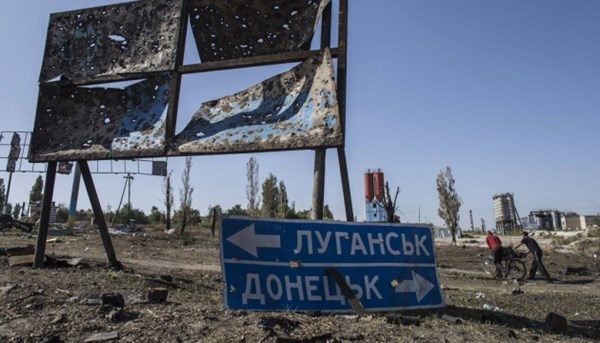Ukrainian press: Pro-Russian militants will gain ‘gray zone’ territory if the troops are withdrawn in Donbas
It’s pretty obvious that a withdrawal of forces and equipment along the demarcation line (if synchronized) will only play into the hands of the occupation corps. In most places, the illegal armed groups will only nominally withdraw their forces, says military expert Mikhail Zhyrokhov in his article for Business Capital.
According to Zhyrokhov, if one looks at the geography, the Armed Forces of Ukraine will be losing dominant positions almost everywhere, not to mention three dozen settlements. After the five years of war, Zhyrokhov observes that most of their inhabitants have willingly or unwillingly started supporting Ukraine, with many of them becoming volunteers or soldiers. And now their and their families’ lives are in terrible danger.
Another expert draws attention to fact that the “demilitarized zone” (more likely, the zone that the militants will simply capture) includes Avdiivka, whose coking plant is an attractive target for the occupation authorities. Falling into the gray zone will mean only one thing for this strategically important enterprise: partial or complete suspension of operations.
A similar opinion is held by Andriy Rymaruk, a Donbas war veteran and employee of the Come Back Alive foundation. He told Ukrayinska Pravda in an interview that the example of Stanytsia Luhanska shows that the Kremlin’s puppet republics cannot be trusted.
Rymaruk said that the war will not end even if Ukraine withdraws its forces along the entire demarcation line. The shelling will continue.
The veteran claims that disengaging effectively means handing over a large chunk of the gray zone. If Ukraine relinquishes the settlements that make up 15% of the entire demarcation line, these settlements will become a “tasty morsel” for the enemy’s sabotage groups and special forces. From a military perspective, withdrawing troops is critically dangerous, Rymaruk warns.
Denys Kazansky, a journalist from Donetsk, writes on his blog that negotiating with Russia and the so-called Luhansk and Donetsk People’s Republics (LPR and DPR) is simply a waste of time, because the Kremlin is merely playing the fool and does not actually intend to do anything,
He points out that Russia doesn’t even admit to being part of the conflict, and claims that it cannot guarantee anything. In Kazansky’s opinion, it is pointless to sign any kind of documents while Russia maintains such a position.
Kazansky asserts that the LPR and DPR are actually Russian private military companies (PMCs). Consequently, he remarks, it is impossible to make an agreement with them, because PMCs do not sign truces. A truce can only be agreed to by whoever is paying the PMCs, but Russia is refusing to acknowledge its involvement in the war, which is essentially a vicious circle.
Members of the Kremlin have stated openly that they do not intend to give Ukraine control over the separate Donbas territories even if Ukraine agrees to fulfill the Minsk Agreements. In this case, Kazansky writes, what is the point of continuing any negotiations with Russia?
In the last half a year, Ukraine’s foreign political position has plummeted, even though it enjoyed extremely strong international support in the spring of 2019. The decline is a direct consequence of
the ongoing campaigns against “war parties” in Ukraine, observes the Russian political scientist Andrey Piontkovsky.
In the expert’s opinion, by denouncing the previous government as a “war party”, those currently in power have presented Ukraine to the global community as a “war party”, thereby taking away Putin’s responsibility for the aggression.
Piontkovsky says that for six months the West has heard Kyiv saying that they have defeated a certain “war party” in Ukraine. And now, put yourself in the position of Emmanuel Macron, Angela Merkel or other western politicians who have supported Ukraine in some way or other for quite a long time. Ukraine itself is claiming that for five years it was led by a “war party”, essentially implying that there was no Russian aggression.
The political scientist stresses that, in a country resisting the aggression of a military superpower, there can be no “war party” by definition.
Paradoxical as it may seem, the so-called Luhansk People’s Republic is currently undergoing a census, writes the Luhansk-based blogger Olga Kucher in an article for the Ostrov news site.
The blogger notes that the survey is primarily asking about three things – citizenship, nationality, and mother tongue. And when a respondent innocently replies “I’m Ukrainian on my father’s side,” the census official puts down “could be either nationality”. But if the respondent mentions one side belonging to the “correct” answer – “Russian” – the census official will not do the same.
Kucher remarks that the census is only superficially interested in the question on citizenship, too: “Don’t you have an LPR passport yet?” Apart from gender, age and social characteristics, it turns out that the entire census is simply designed to establish how many Russians and Russian-speakers live there.
